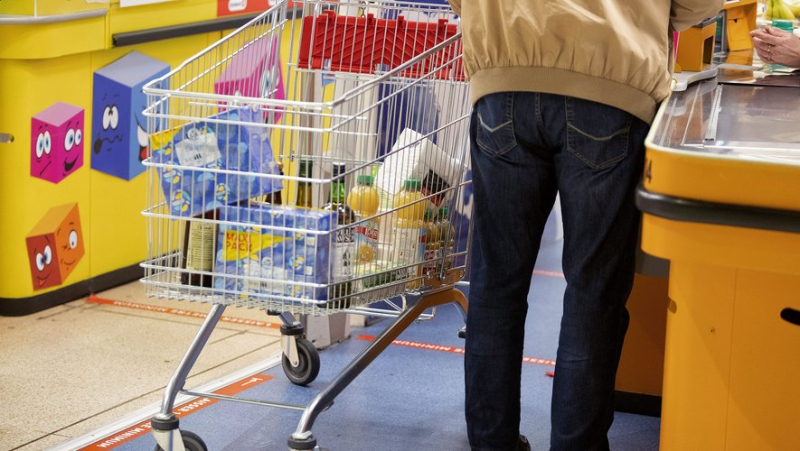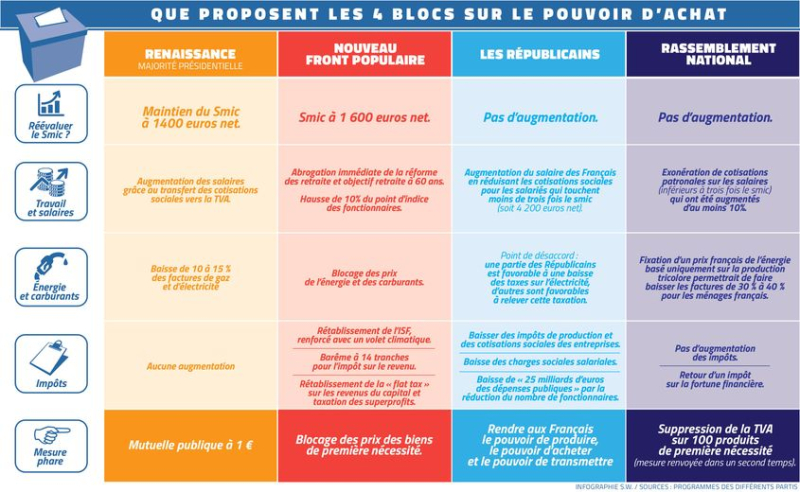“The issue of purchasing power is the one that will mainly decide voters”: Midi Libre deciphers the programs for the 2024 legislative elections

Au coeur des préoccupations de s Français, le pouvoir d'achat est aussi au centre de la campagne électorale. MAXPPP – Guillaume Bonnefont
Premier volet de notre série consacrée au decryptage des programmes des candidats aux élections législatives avec le pouvoir d'achat. Après les annonces programmatiques, les formations politiques attaquent les mesures concurrentes, ou ceux qui font marche arrière.
"Giving purchasing power back to the French". This is a promise from all political parties. Without exception. By increasing wages or blocking the prices of fuel, energy or everyday consumer products."The issue of purchasing power is that which will mainly decide the voters, explains analyst Brice Teinturier, director of Ipsos. But also that of immigration which is gradually establishing itself as a dominant theme.

The main measures envisaged by the candidates.
"Assault of proposals"
Responding to the economic problems of the French will probably be thwarted by the other issues of this unprecedented campaign, the shortest of the Fifth Republic. Because it also touches on the problem of significantly increasing taxes and taxes, as political scientist Chloé Morin points out: "On purchasing power, all the candidates are making an onslaught of proposals. The question is their ability to finance these measures. On the other hand, controlling immigration and security are other priorities of a good part of the French, and on the subject the left seems rather to be deadlocked.
The true cost
The Montaigne Institute has carried out calculations on the various proposals linked to purchasing power as reported by Les Échos. And it will be very expensive as the European Commission has opened an excessive deficit procedure against France. Even if the political parties tried to explain how they were going to finance their expensive promises.
Thus, the new Popular Front presented, last Friday, at a press conference, how they intended to recover 30 billion euros by taxing superprofits (for 15 billion euros) and the ultra rich.
However, costs are soaring. Thus, the VAT measure promised by the National Rally could amount to more than 11 billion euros; the financial weight of the exemption from employer contributions on 10% salary increases would rise to 800 million in 2025 and, according to calculations by the Montaigne Institute, would then rise to 4.8 billion two years later.
At the new Popular Front, the announced increase of more than 10% in the minimum wage would cost 3.5 billion euros. Blocking essential prices would also involve 24 billion euros in public spending.
Which makes Marie-Pierre de Bailliencourt, general director of the Montaigne Institute say that there may be "doubts about the feasibility of certain measures.Indeed, increasing the minimum wage by more than 10% would require a decree signed by Emmanuel Macron and a vote on financial texts in the Assembly, which could be compromised without an absolute majority. The reduction of VAT on the RN's energy products would require the agreement of Brussels for gas and electricity. It would even be necessary to renegotiate the European directive on VAT rates for fuel.
On the side of the presidential coalition, which wants to set in stone its refusal to increase taxes, is faced with the amount of “the debt which deprives us of any room for maneuver and our sovereignty depends on controlling our financial trajectories. “We cannot ignore a genuine reform of the State” , concludes Marie-Pierre de Bailliencourt. Promises that are hard to keep, in short
In a context of inflation, which has certainly slowed down, but which has had a very large impact on voters' wallets, the parties are playing the game of outbidding. It is the program of the new Popular Front that has gone the furthest by proposing to immediately increase the minimum wage, to freeze the prices of basic necessities and to reduce the energy and fuel bill. The National Rally followed suit but backtracked on certain measures as the weight of future responsibilities approached.
Gabriel Attal very virulent
To avoid being left behind, the presidential majority through its Minister of the Economy, Bruno Le Maire, conceded on the matter"that’we will have to go much further". While castigating those who promise to shave for free without worrying about the budgetary consequences.
But it was Prime Minister Gabriel Attal who was the most virulent on the two competing programs. By reducing the RN program to "the unpreparedness, the draft and the fog" in particular on the power of& ;rsquo;purchase of a program which "is’completely emptied".
As for that of the left coalition in the "camp of compromise and dissimulation", of which the only beneficiaries on purchasing power will be "the distributors who strengthen their margins". Enough to leave doubtful voters who no longer really believe in electoral promises and risk, ultimately, not really taking a position on this nevertheless essential theme.
I subscribe to read more




